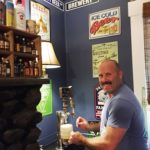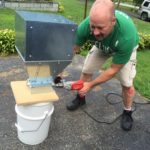Standing in front of his fermenter, Charlie Herbert shows off the brew pot and stirrer he uses when crafting his own beer.
By Lori Berkey, Contributing Writer
Shrewsbury – Charlie Herbert received a Christmas present in the late 1980s that unraveled into a hobby he’s kept up for the more than 25 years since. It was a book by the English beer expert, Michael Jackson, that described different beers from all over the world. Accompanying this gift was basic kit for making home brews.
Herbert was curious about different types of beer, and had never heard of most Jackson wrote about. At the time, international craft beers were not readily available, and he wanted to know how they tasted. With his kit, he could find out.
His first attempt was a pale ale.
“I didn’t expect beer made from a kit to be good, but it was delicious,” Herbert said, “Then, I thought, I can make all these different types of beer and I don’t have to go around the world to find them!”
For his inaugural kit batch, Herbert used canned syrup with hops in it, and dry yeast. He followed the directions and put it on the stove to cook. The whole thing boiled over and made a huge mess. He scooped up what he could, dumped it into the five-gallon plastic kit bucket, waited until it fermented, and bottled it. It was the last time he ever wanted to use a kit for making beer.
Thirsty to learn more about how to make beer, he read “The Complete Joy of Homebrewing.” Herbert was working on his Ph.D. in organic chemistry and said that, although the book was very general, he saw there was a lot a chemistry in it.
“I realized making beer would be a way to enjoy my chemistry and be a fun hobby doing what I love to do,” he said.
He found a beer recipe for barley wine and bought the right syrup and hops to make it. He studied how to achieve the best flavor and learned if too high of a temperature is used for steeping grains, the beer will taste like medicine; and if it’s too, low there’s no flavor.
The barley wine came out to his liking. The only thing that bothered him was he had never had barely wine before so he didn’t know if what he made actually tasted like barley wine. But soon a brew pub opened nearby and they had it. When he tried theirs, he was thrilled it tasted the same as his.
“I found out the way to make a fresher, less off-flavor beer is to use liquid yeast instead of dry,” he said.
He got equipment to culture his own yeast and a lab notebook to record his process. Next, he swapped out the plastic bucket for a glass one to prevent off-flavors due to oxygen going through the plastic. He also got a bigger pot to boil the wort (unfermented beer) which allowed better extraction from the grains and hops, improving overall flavor.
Soon he went to all grain and started using a heating and cooling fermenter, attaching a thermometer to control the temperature.
Then he got more into it.
He started mashing barley grains, making his own syrup instead of buying it. An even bigger pot and a new propane burner allowed for bigger batches.
“I began to keg my beer so I didn’t have to fill 150 bottles per batch, and I could have it on tap at my house in Shrewsbury for everyone to enjoy,” he said.
Next he added a grain mill to crack his own grains and started growing his own hops for fresher flavor.
Now 51 and having worked as a chemist for many years, Herbert still enjoys using his chemistry knowledge as a pastime.
“I like the creative aspect,” he explained. “As an organic chemist, I understand the variables and how to control them. I love making a batch and having other people enjoy a beer with me that they can’t get anywhere else.”
He’s converted his living room into a mini tavern, complete with a tiki bar, pub signs and pepper lights.
“It’s always satisfying at the end of the day to come home and pour a beer you made right from your own tap,” he said.
Photos/Lori Berkey














